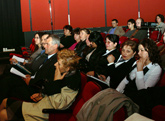 Tuzla, 19 April 2012
Tuzla, 19 April 2012
On 18 April 2012, the ICTY Outreach programme held a screening of its documentary 'Sexual Violence and the Triumph of Justice' in Tuzla, Bosnia and Herzegovina (BiH), as a part of a public dialogue on wartime sexual violence and the responsibility of states. The event was attended by some 40 guests, including victims, government officials, academics, civil society representatives and journalists.
The public dialogue, organised in cooperation with NGOs TRIAL and Medica Zenica, and with the support of the UN Women Mission to BiH, highlighted the challenges, gaps and efforts required in obtaining justice and redress for survivors of wartime sexual violence in Bosnia.
Speaking about the significance of the film, Dr Mevludin Hasanović, neuropsychiatrist and head of the Tuzla Canton Psychiatric Association, said: “The documentary on sexual violence is very informative and focused on important issues related to this type of crime. It makes one reflect on the legal system that we have lived under so far and on how to move forward after the completion of the Tribunal’s mandate. The film should be used for public education and could play a very important role in a treatment of traumatised people. Victims should be encouraged to seek their rights without feeling ashamed, and the whole community should come to recognise what a serious violation of humanitarian law these crimes are.”
One of the attendees, Branka Antić-Štauber, head of the Tuzla-based NGO Snaga žene, said: “Although the film may have re-traumatising effect, as a flashback of war experiences, it has an important link to the issue of transitional justice, because it involves all victims of this particular crime in BiH. Indeed, the testimonies of victims of all three nationalities convey that we were all affected by this particular crime, and that will contribute to overcoming mistrust and eventually to reconciliation.”
The screening was followed by a roundtable discussion. The panelists - including ICTY Registry Liaison Officer Almir Alić, TRIAL representative Selma Korjenić, Tuzla chief prosecutor Šesenam Ćosić, head of Medica Zenica Sabiha Haskić, and Jasna Zečević head of Vive žene Tuzla - spoke about of the obligations of states in ensuring accountability for crimes of wartime sexual violence and providing reparations and support to victims and witnesses, as well as the challenges facing local courts prosecuting these types of crimes.
The Tuzla screening was one of four such events to be held in April and May 2012 – with the others being in Sarajevo, Mostar and Prijedor - with the aim of engaging the wider community of these areas in a dialogue on the important issues raised by the film.

